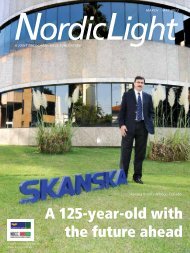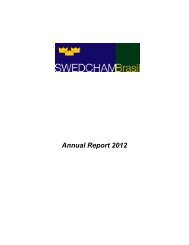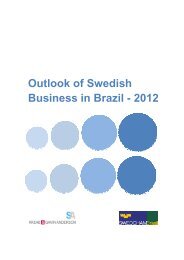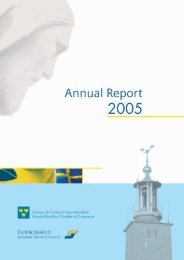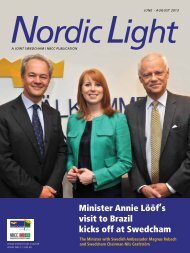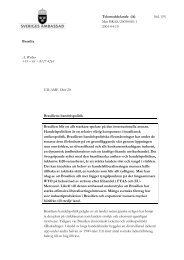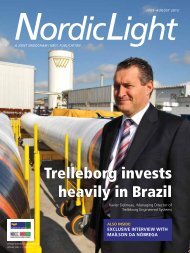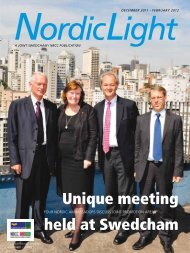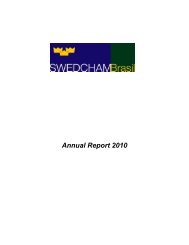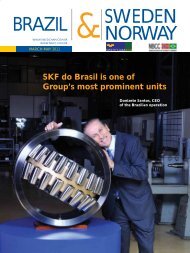Brazil Is Volvo Cars' Fastest Growing Market Worldwide
Brazil Is Volvo Cars' Fastest Growing Market Worldwide
Brazil Is Volvo Cars' Fastest Growing Market Worldwide
You also want an ePaper? Increase the reach of your titles
YUMPU automatically turns print PDFs into web optimized ePapers that Google loves.
Funds in benefi t of social<br />
responsibility<br />
By Márcio Godoy and Karina Ruffo*<br />
IN BRAZIL, THERE ARE MORE THAN 800 SOURCES OF FUNDS. THE VALUE OF<br />
THE FUNDS AND INCENTIVES, BOTH PUBLIC AND PRIVATE, AMOUNT TO AN<br />
IMPRESSIVE R$ 65 BILLION PER YEAR. IT IS WORTH MENTIONING HERE THAT<br />
A LARGE PART OF THESE FUNDS IS NOT USED DUE TO LACK OF KNOWLEDGE<br />
AND THE RED TAPE INVOLVED IN THE PROCESSES.<br />
In the new administrative order of companies,<br />
the budgets of each sector that<br />
comprise the managerial structure are<br />
limited due to the current tight fi nancial<br />
situation at both national and international<br />
fi rms. Nevertheless, accompanying the<br />
contemporary entrepreneurial<br />
view (where it is essential to be<br />
involved in social responsibility<br />
actions), departments such as<br />
human resources, marketing,<br />
fi nances, administration, presidency<br />
or vice-presidency seek<br />
funds so that they may develop<br />
projects aimed at socio-environmental<br />
initiatives.<br />
Although lack of knowledge<br />
predominates in the sector, currently<br />
there are fi scal incentives<br />
and public or private funds for<br />
the start-up and expansion of companies,<br />
the import of antiquities to form personal<br />
or museum collections, as well as sources of<br />
incentives that allow for the reduction of tax<br />
payments (such as the ICMS value-added tax<br />
on products and services, Income Tax and ISS<br />
services tax), fi scal incentives that allow for<br />
the donation of land for the construction of<br />
factories, fi scal incentives for environmental,<br />
cultural and sports initiatives as well as for<br />
children and adolescents, audiovisuals, and<br />
science and technology projects,<br />
among others. In all, there<br />
are more than 800 sources of<br />
funds and incentives, public<br />
or private, that amount to the<br />
impressive fi gure of R$ 65 billion<br />
per year in <strong>Brazil</strong>. And it is<br />
worth mentioning here that a<br />
large part of these funds is not<br />
used due to lack of knowledge<br />
and the red tape involved in<br />
the processes.<br />
A book entitled “103 tips<br />
– what every company needs<br />
to know to use fi scal incentives” (by Márcio<br />
Godoy, Karina Ruffo and Kátia Seadi) is aimed at<br />
informing companies and their respective departments<br />
about how to use the fi scal incentive<br />
laws in a correct manner.<br />
Karina Ruffo<br />
Márcio Godoy<br />
Here are some of these sources of funds:<br />
� Charity Law (United States) – Use of up<br />
to 10% of Income Tax due in the U.S. aimed<br />
at social responsibility projects in <strong>Brazil</strong>;<br />
� Federal Sports Law – Use of up to 1%<br />
of Income Tax due (real profi t) for sports<br />
or paraplegic sports projects;<br />
� Rouanet Law – Use of up to 4% of Income<br />
Tax due (real profi t) for cultural projects;<br />
� Audiovisuals Law – Use of up to 3% of<br />
Income Tax due (real profi t);<br />
� FIA (Childhood and Adolescence Fund)<br />
– Use of up to 1% of Income Tax due (real<br />
profi t) for social projects in the areas of<br />
childhood and adolescence;<br />
� OSCIP (Civil Society Organization of<br />
Public Interest) – The donating company<br />
must be taxed under the real profi t<br />
regime and will be allowed to make a donation<br />
using the incentive up to a maximum<br />
of 2% of operating profi t;<br />
� Teaching and research organizations –<br />
The value of the donations made to these<br />
institutions can be deducted up to a<br />
limit of 1.5% of the operating profi t (real<br />
profi t);<br />
� ICMS States – Use of up to 5% in projects<br />
in the areas of culture, social responsibility,<br />
sports or tourism (states of<br />
São Paulo, Rio de Janeiro, Santa Catarina,<br />
Rio Grande do Sul, Espírito Santo, Minas<br />
Gerais, Bahia, Pernambuco, Pará and<br />
Mato Grosso;<br />
� ISSQN/IPTU Municipalities – Use of up<br />
to 20% in cultural and sports projects<br />
(Florianópolis and Itajaí/Santa Catarina,<br />
São Paulo/SP, Rio de Janeiro/RJ and Recife/PE).<br />
*Márcio Godoy and Karina Ruffo are respectively<br />
Executive Director and Sponsorship Consultant<br />
at Swedcham member Instituto Movimento Pró-<br />
Projetos (www.projetoscomatitude.com.br)<br />
BRAZIL & SWEDEN NORWAY 39



